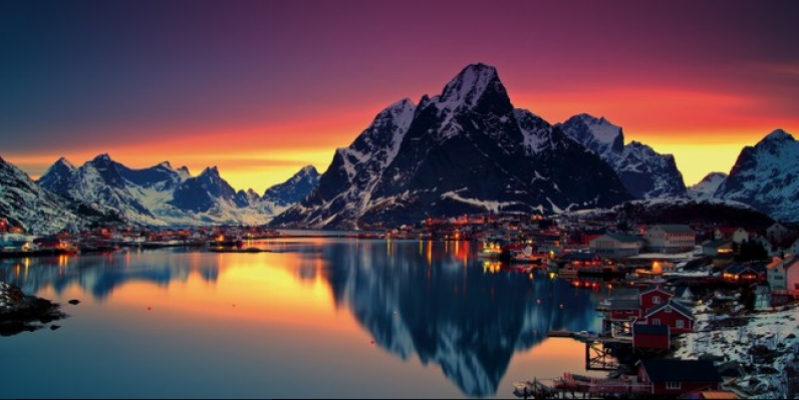Surrounded by mountains, fjords carved situated on the coast, Bergen, Norway's second largest city, is famous for its picturesque sights. In addition, in Bergen, as one of the prosperous Norwegian oil and gas industry centers, where many wealthy people live.
But here's a pretentious splurge - a rare phenomenon in this city will not see very luxurious car tinted glasses or boutiques, selling designer handbags, not here and rows stretching to fancy nightclubs. Inform the BBC.
If other countries are discovering oil will soon enjoy the proceeds from Norway, by contrast, continues to invest in oil and gas proceeds to the giant sovereign wealth fund.
About 800 billion. dollars (about $ 2 trillion. 94 billion. dollars) the value of the fund owns 1 percent. Total capital of the world, and is big enough for each resident of the city to become a millionaire (on the country's national currency, the krona). In fact, it's a huge savings account.
And the majority of Norwegians, it seems, at the very satisfying - as the New York's Columbia University in 2012, the study was conducted in Norway is one of the happiest countries in the world.
"We had to invest a lot of money to spend for someone to help us," - says Professor Alexander Cappelen from NHH (Norwegian School of Economics), explaining how the country has managed to avoid the dangers of the huge estate.
"In other countries much easier to extract the oil, so they immediately receive income from it. Had us their views on long-term plan."
Trust in government
Norway is therefore not in a hurry to spend. In fact, here's instructions carefully observed, for which only 4 percent. fund surpluses can be spent or invested in public projects.
"In fact, we currently spend less than 4 percent. - We save," - says Professor A. Cappelen.
According to him, there are several reasons why Norway will be happy to save their property, and shrugs off the temptations of a luxurious life.
"In order for this system to work, takes a lot of trust - says Professor A. Cappelen - Trust in the money
will be properly managed and used - that they will not spend as you do not want them to be released. On the social democratic and egalitarian society, this policy is a homogeneous, based on high confidence. We have confidence in the government. We believe that the money collected from this tax will be spent wisely. When you begin to trust that the other has a stake, then your deposit, happy. "
So how can there? Norway is rich on Norwegian high confidence or trust in its citizens because they are rich?
"I think both statements are true, - says Professor A. Cappelen. - High confidence facilitates economic growth."
But the prosperity of the oil drop. And what's next?
"Norway's economic situation is indeed very favorable. We're talking about the gradual changes that we expect over the next few years - says the Norwegian finance minister Siv Jensen. - In the past few years, the growth has slowed down, and the current government has a competitive tax system and reduce red tape to attract investment. But do not forget that the Accommodation here more expensive than in other similar countries. "
Norway visiting foreign guest prices may lead to shock. The café in front of the Bergen Fish Market cappuccino cup costs about ten dollars (twenty-six), says Business Region "Relations Manager Hartvedt tone, explaining that just the price earnings ratio and proportion.
"This may come as a surprise, but we are such a price is not too high - say Mr Hartvedt. - Summer and winter vacations, we usually spend their summer houses and cottages, and life for us here is not expensive. Comfortable It."
However, unfamiliar with the specifics of the country's foreign guests such high prices striking - a visit to the local supermarket reveals that the cheapest pasta, bread, cheese and tomatoes will lay about fifty dollars (about 130 million).
But, as they say T. Hartvedt, we pay salaries to its employees, for which they can expect a good quality of life. Else It is not like London. Here, we respect the hard work, but we do not believe that the company's best-paid employee would earn much more the least paid employee. And that means that some very talented people leaving to live in another country where they will be paid more. "
So do the people who live in Norway consider themselves rich? "No, we do not think we think about the future," - says T. Hartvedt.



